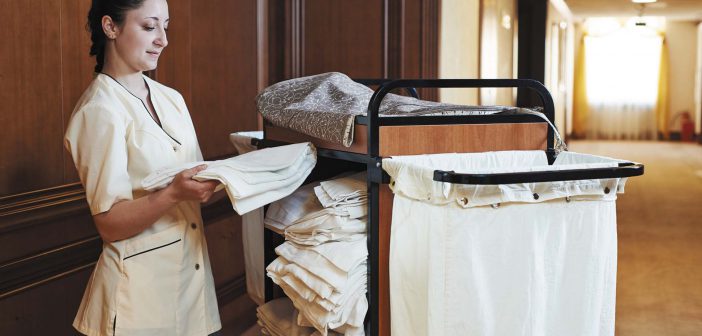by Larry Mogelonsky, MBA, P.Eng.
For the majority of hotels nowadays, a perennial issue with no easy solutions is staffing, both in terms of how to cut costs and how to keep top talent engaged. Given that the housekeeping department is more often than not the largest hotel operation in terms of payroll and staff numbers, looking for solutions in this area should be on every hotelier’s mind. With the modern traveler increasingly sensitive to cleanliness errors, it’s the perfect time to evaluate all options for giving this department a boost. Even with new technological introductions, many housekeeping departments are still run the same way they were three decades ago.
No Longer Faceless
A traditional outlook on room attendants was that they would be invisible to guests, working clandestinely to clean rooms and finish turndown service, and leaving the interaction side of things to other frontline staff. As the demand for mobile check-in increases, however, the front desk is losing some of its power to deepen the customer rapport, meaning that housekeepers are now acting as one of the only points of contact between visitors and the hotel.
The effects of this trend play out in a few ways. Firstly, there is an increased need for the training of interaction skills so that room attendants can properly communicate with guests, especially in the country’s native language in which members of this department may not be fluent.
With guests increasingly making service requests directly to the housekeeper, that employee must have the proper tools to quickly relay that desire to the appropriate people. It’s also a matter of ‘guest intelligence’ whereby simply asking visitors how they are feeling might elicit powerful information that can then be utilized to build profile data and deepen personalization.
Nowhere are these language skills more important than for maintenance issues, though. Guests are hypersensitive to broken items, so engineering and housekeeping must be in constant contact. Of course, there are several prominent technology solutions to satisfy this internal communications need, but then the worry is over whether the room attendants will use it.
As with any new hardware or software implementation, the solution must be incentivized in order for daily habits to form. This means that the executive housekeeper must first lead by example and inspire his or her team to utilize the new technology. Recently, however, gamification and rewards-based usage models are being deployed.
Where technology can also give your department an upgrade is in route mapping to both streamline the time taken to reach rooms for cleaning as well as knowing when rooms are occupied so guests are never disturbed. Furthermore, with each new room feature that is put in place to satisfy the changing traveler demands – such as new ergonomic desks or wall-mounted swiveling flat screens – there is a new SOP for the room attendant to follow, and yet the number of ‘how to’ guides are not keeping pace with these checklists. For this, new technologies can be harnessed to heighten the team’s aptitude on all the new toys so no one ever feels overwhelmed.
Career Prospects
One primary reason for why your housekeeping department may be suffering from staffing shortages or high turnover rates stems directly from this ‘faceless’ persona in that the line of work is deemed as a job and not a career. For this, there are no quick fixes and it will require a thorough rethink about how you value all your employees and mentor them into leadership roles.
Incentives are quite fruitful in this regard, both as small monetary rewards or other forms of prizes. Many managers remarked that oftentimes a star room attendant will help fill staffing deficiencies by recruiting his or her friends. However, this doesn’t correct the overarching issue of a general lack of vertical advancement prospects for the individual housekeeper. Compounded with that, the majority of the team is sourced from the boomer population as millennials are by and large not attracted to this line of work, deeming it too arduous for too little pay.
One proposed solution was to institute a rotational program whereby members of the housekeeping department would have the opportunity to shift to other operations after a certain number of months. This would give increased exposure to a variety of dynamic work environments while also ensuring that everyone understands the fundamental crucial role that housekeeping plays in any property.
Even though it’s already well-established for other aspects of a hotel, empowering your room attendants is a great motivational tool to keep them engaged. And this doesn’t need to be anything grandiose. Instead, empowerment is best deployed for the small touches that can mean all the difference for a guest.
For instance, if a room attendant notices that a guest is sick, he or she might ring down to the kitchen to have a bowl of soup brought up. Or if a guest is nearly out of toothpaste, the housekeeper should be authorized to offer a replacement. In essence, this is the old sales mantra of always giving a little bit extra. If guests complain that their in-room coffee wasn’t replenished, then return with a full assortment of roasts for them to try. If a room attendant notices that a person’s shirt is ripped or frayed, then leave a note that mentions your onsite laundry with mending services available.
In this sense, empowerment works to give more responsibility to individual team members so that they feel as though their work is truly valued. Importantly, housekeepers must be made aware of how their extra effort pays off. Instead of only reacting to negative reviews that crop up online, also keep track of guest comments that specifically call out all the superb work that the team has done to make the guest experience all the more special. A little goes a long way, both for the customer as well as the employee.
Lastly, to attack the career question head on, if you want to have a committed team, they need to know that there are opportunities to move up, both with increased responsibility and increased salary. When this subject was approached during the conference, one question that was posed was how many general managers started in housekeeping. After a consensus was reached with the answer being close to zero, the follow-up pertained to how could we ever hope to attract top talent if their career options are limited. Your organizational culture must support vertical advancement from within the housekeeping department – and all operations for that matter – if you are ever going to solve your staffing issues.
Modern Service Delivery
Directly linked to career advancement but with a guest-centric point of view, your housekeepers must play a critical role in elevating your service delivery to where it needs to be in order to impress the modern traveler. With millennials and centennials now representing the majority of consumers, you must adjust to what they want.
As previously mentioned, any housekeeping or maintenance errors are deal breakers for these guests. Extremely wary of rooms that have been used by numerous other people, travelers nowadays may even inspect such hard-to-clean areas like under the bed or around the back of the nightstand. Moreover, they increasingly want fragrance-free rooms without the application of chemical cleaning products. Add to that a heightened sense of duty to the environment, and all these factors contribute to a drastically altered procedure for the housekeeping department should operate.
On this latter point, room attendants are increasingly important for demonstrating to guests that the hotel takes sustainability practices seriously, frequently overlapping with new processes that decrease the amount of time it takes to clean a room. The first and most vital step is a waste audit which may reveal several prominent ways that housekeepers can help to meet this modern service expectation.
Towel and linen recycling programs mean that housekeepers may not have to change the bed or give fresh towels every day, while transitioning from mini-bottles to dispensers likewise reduces the workload. Moreover, switching to organic cleaners often means using more versatile products thereby allowing you to cut the number of cleaners required, satisfying the fragrance-free crowd and decreasing what housekeepers have to carry around with them. Such little activities are significant because guests don’t see all the large-scale back-of-end environmental improvements that you’ve made to your water or electrical systems.
The Bottom Line
Any way you slice it, this is still a numbers game. While hoteliers value their team and strive to treat them like family, there will always be the mandate to cut costs. One metric that helps to frame the issue is ‘minutes per occupied room’ whereby your goal is to minimize this number through a holistic investigation of every activity your housekeepers undertake.
There is a high correlation between those actions you take to decrease this MinPOR figure and how engaged your team is. Lowered MinPOR means a reduced workload but it can only be attained by recruiting your housekeepers to help address the problem. And therein lies the real solution – get your team involved to answer the real questions and the cost savings will come. ■
One of the world’s most published writers in hospitality, Larry Mogelonsky is the principal of Hotel Mogel Consulting Limited, a Toronto-based consulting practice. His experience encompasses hotel properties around the world, both branded and independent, and ranging from luxury and boutique to select-service. Larry is also on several boards for companies focused on hotel technology. His work includes four books “Are You an Ostrich or a Llama?” (2012), “Llamas Rule” (2013), “Hotel Llama” (2015), and “The Llama is Inn” (2017). You can reach Larry at [email protected] to discuss hotel business challenges or to book speaking engagements.
PHOTO CREDIT: DMITRY KALINOVSKY/SHUTTERSTOCK





1 Comment
I appreciate how the article identifies common issues such as staff turnover, training and communication gaps, time management, and maintaining consistency in cleaning standards. It recognizes the significance of addressing these challenges proactively to ensure the smooth functioning of the housekeeping department.